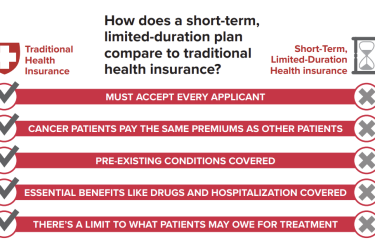
The proposed combination of one of the nation’s largest health insurers, Cigna Corp., and the nation’s largest pharmacy benefits manager (PBM), Express Scripts Holdings Company, is unlikely to benefit consumers much, if at all. But to their credit, health care journalists are digging into how consumers might benefit from the deal.
These questions are important, given that the Cigna-Express Scripts deal follows an announcement three months earlier that CVS Health would pay $69 billion for Aetna Inc., another major health insurers, in a deal “that could reshape the health industry,” as the New York Times reported. Pharmacy retailer CVS Health also owns a PBM, CVS/Caremark.
In addition to asking how these deals will affect consumers, journalists are asking about how PBMs work and whether they help to control costs or are just another middleman adding administrative costs to an already-bloated health care system. Lynn Arditi and Talia Blake reported for Rhode Island Public Radio that the proposed CVS-Aetna deal is not likely to benefit consumers. Though CVS and Aetna shareholders have approved the deal, the Wall Street Journal noted that both companies had received additional requests for information from federal regulators, which Bruce Japsen also covered for Forbes.
Cigna and Express Scripts on March 8 announced an agreement in which Cigna would acquire the PBM in a cash and stock deal valued at about $67 billion. In the deal, Cigna would assume some $15 billion in Express Scripts debt.
A week later, Bob Herman at Axios gave us an inside look at a template for an Express Scripts contract. The template provides a view into how PBMs steer negotiations with drug companies to benefit their financial interests. “Express Scripts and employers use the document as a starting point to determine how medications are paid for and how pharmacy networks work, but the contract usually is not in the public’s view,” Herman added. “Since it’s a template, there are no hard numbers or terms of any specific agreements.”
For an article in the Los Angeles Times, Jaclyn Cosgrove addressed the same question regarding the proposed Cigna-Express Scripts combination, writing that the goal of such deals often is to benefit shareholders, not consumers. Cosgrove quoted Larry Levitt, senior vice president for Health Policy at the Kaiser Family Foundation, as saying, “As is often the case, when one company buys another, it’s to increase earnings – helping consumers is not foremost in their minds when constructing these deals.”
The Cigna-Express Scripts deal also is a continuing sign of consolidation in health care as large companies seek to control the rising cost of pharmaceuticals, Cosgrove wrote. In January, we covered how consolidations among insurers, pharmacies and providers were reshaping the health care system.
In addition to addressing the issue of whether the deal with benefit consumers, Cosgrove also explained how PBMs work, which is no easy task. PBMs act as brokers by contacting with pharmaceutical manufacturers, health insurers, self-insured employers, union health plans and government purchasers to select, buy and distribute prescription drugs, she noted.
Cosgrove cited a policy brief, “Pharmacy Benefit Managers,” which Health Affairs published last September. PBMs influence which drugs are used most frequently and set terms for how much pharmacies get paid because they get rebates from drug makers in exchange for preferred placement on health plan’s formularies, the brief noted. (A formulary is a list of drugs a health plan, employer, or another purchaser will pay for or cover for its insured members.
One issue that frustrates researchers and reporters about PBMs is how much they can earn because of their negotiations with payers and pharmaceutical companies over rebates and discounts. As Cosgrove explained, PBMs do not pay drug companies the list price for medications, because they get rebates that reflect either good negotiating or inflated drug prices. “Some health care policy experts argue that this sets up a strange incentive for the benefit manager,” she wrote. “Because they collect part of the rebate – and do not disclose publicly how much they’re getting from rebates – benefit managers stand to gain from higher list prices.”
Citing this report, “The Flow of Money Through the Pharmaceutical Distribution System,” from the USC Schaeffer Center, Cosgrove explained that PBMs do not reveal the size of the rebates and discounts they negotiate with pharmaceutical manufacturers.
Cosgrove discussed a bill in the California Assembly that aims to address contractual restrictions, which opponents call “gag clauses,” that PBMs place on pharmacists. “ ‘Even if a patient asks their pharmacist if paying in cash would be less expensive, some contracts restrict what a pharmacist can say,’ said Jon Roth, head of the California Pharmacists Association,” Cosgrove wrote.
Robert Pear explored the problem of gag clauses in a New York Times article last month. Such clauses force pharmacists to remain silent when a consumer would pay $125 under an insurance plan for a particular drug, he wrote. The same drug might cost $100 if the consumer paid cash, he added. His article carried this grabber of a headline, “Why Your Pharmacist Can’t Tell You That $20 Prescription Could Cost Only $8.”
To fight back against such criticism, Express Scripts said in March that the deals it cuts with pharmaceutical companies help consumers save money, as Robert Langreth reported for Bloomberg. The company said the cost of drugs for its employer, union and other commercial plans rose just 1.5 percent last year, the smallest increase in the more than 20 years and that rebates were included, costs declined for almost half of its commercial clients, he wrote. Without these middlemen, drug manufacturers would charge whatever they want, Langreth added, quoting an Express Scripts executive.
Carolyn Y. Johnson reported for The Washington Post about an initiative that could help consumers pay less for prescription drugs. Next year, the health insurer UnitedHealthcare will give rebates directly to members, reducing out-of-pocket costs for some 7 million Americans in United’s fully insured commercial group benefit plans, she wrote.







